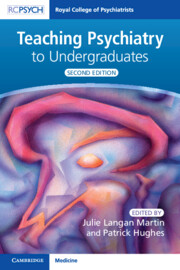Book contents
- Teaching Psychiatry to Undergraduates
- Teaching Psychiatry to Undergraduates
- Copyright page
- Contents
- Contributors
- Section 1 Principles of Medical Education
- Section 2 The Undergraduate Psychiatry Curriculum: Planning and Delivery
- Section 3 Clinical Placements in Psychiatry
- Section 4 Formal Teaching
- Section 5 Materials Development
- Section 6 Gathering feedback and quality improvement
- Chapter 6.1 Quality in Medical Education
- Chapter 6.2 Quality in Practice
- Chapter 6.3 Gathering Feedback
- Section 7 Student Welfare
- Section 8 Developing as a medical educator
- Index
- References
Chapter 6.3 - Gathering Feedback
from Section 6 - Gathering feedback and quality improvement
Published online by Cambridge University Press: 12 October 2022
- Teaching Psychiatry to Undergraduates
- Teaching Psychiatry to Undergraduates
- Copyright page
- Contents
- Contributors
- Section 1 Principles of Medical Education
- Section 2 The Undergraduate Psychiatry Curriculum: Planning and Delivery
- Section 3 Clinical Placements in Psychiatry
- Section 4 Formal Teaching
- Section 5 Materials Development
- Section 6 Gathering feedback and quality improvement
- Chapter 6.1 Quality in Medical Education
- Chapter 6.2 Quality in Practice
- Chapter 6.3 Gathering Feedback
- Section 7 Student Welfare
- Section 8 Developing as a medical educator
- Index
- References
Summary
This chapter outlines the value of gathering student feedback. It offers illustrative examples of gathering and incorporating systematic feedback related to the student experience, intended learning outcomes, and professional skills into a cyclical model of curriculum enhancement. Consideration is given to feedback gathering during three key points of course delivery: the design stage, during the course, and following course completion. Feedback can target learning, teaching, and course organisation, as well as the perceived utility of the skills being developed. A selection of methods and approaches to seeking feedback are outlined which can be applied to capture the multitude of outcomes of interest related to students’ skills, performance and experiences. Suggestions are made about how traditional evaluation approaches can be complemented using more democratic, participatory methods such as group reflection activities and workshops. The limitations of student feedback, as well as pertinent ethical issues, are briefly highlighted. Exploration of student satisfaction offers opportunities to optimise the curriculum design, evaluate practice, and inform curricular innovations.
- Type
- Chapter
- Information
- Teaching Psychiatry to Undergraduates , pp. 162 - 167Publisher: Cambridge University PressPrint publication year: 2022

